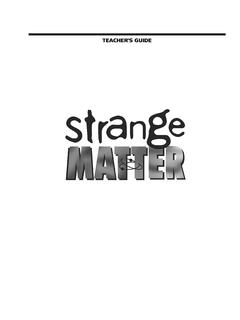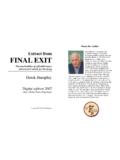Transcription of DUTIES OF THE TEACHER - Michael Scriven
1 DUTIES of the TEACHER : Scriven page 1 version date: Dec 8, 1994 DUTIES OF THE TEACHER Michael Scriven Evaluation & Development Group1 INTRODUCTION The old saying goes: Those who can, do; those who can t, teach. The list of DUTIES in this paper gives the lie to that view by spelling out just how hard teaching is. It shows that the real truth, while less catchy, is more like this: Those who can do these hundred difficult things can teach well; those who can teach well can change the world in their lifetime; those who can t, can rarely do something as important. Teaching is important because most teachers reach more than a thousand students during their career as a TEACHER , and many reach more than ten thousand.
2 Teachers change the world through their students in two ways. Great teachers of the past have inspired individuals and even whole societies to new and better forms of life, to great inventions, to the saving of lives, cultures, and countries (and to their destruction), and to notable discoveries and spiritual revolutions. There are many cases where specific teachers have been identified as providing the inspiration or the suggestions that led to these results. Famous examples include Socrates, the TEACHER of Plato; Aristotle, the TEACHER of Alexander the Great; and Brentano, who was Freud s TEACHER . On the grand scale, the teachers who began most of the great religions have their names enshrined in the honor role or the very title of those movements Buddhism, Confucianism, Christianity, Mohammedanism, Marxism.
3 But the more common role for teachers is that of empowerment. There are myriads of teachers whose solo or team efforts made great achievements possible that would not otherwise have been possible. They did this by good teaching of basic or advanced knowledge, skills, or values, to those who became inventors and leaders the teachers of Pasteur and Einstein, of Gandhi and Sister Teresa and Simone de Beauvoir. That situation is very acute today, when there is more to be learnt than ever before; survival of the individual and of the society is more 1 This is a slightly revised version of the paper published in the Journal of Personnel Evaluation in Education (1994) vol.
4 8, no. 2, pp. 151 184. Thanks to the many people who have made useful suggestions about earlier versions of this paper, particularly to those in my Study of Teaching graduate seminars at the University of Western Australia, 1987-8, and to my research staff on this project in 1991-4, Patricia Wheeler and Geneva Haertel. Their valuable suggestions resulted in many changes. Further criticisms and suggestions for additions, deletions, or modifications are earnestly solicited and should be sent to the author at POBox 69, Point Reyes, California, 94956. This work was partly supported by funding from the TEACHER Evaluation Models Project (TEMP), a component of the work at the Center for Research on Educational Accountability and TEACHER Evaluation (CREATE).
5 CREATE is federally funded by the Office of Educational Research and Improvement of the Education Department, and is located in the Evaluation Center at Western Michigan University, Kalamazoo, MI 49008. DUTIES of the TEACHER : Scriven page 2 version date: Dec 8, 1994 than ever dependent on education to cope with technology and contribute to it. But even with respect to the basics, the mere teaching of literacy is enough to put a student in the top half of the population when it comes to competition for jobs. So, besides teaching minimum competences, which alone are enough to control the quality of life for many, and besides teaching technical or scientific skills which open whole careers to others, there are other key matters to be taught.
6 In every class there are potential leaders, inventors, heroes, authors, and saviors of many others, students whose potentiality cannot possibly manifest itself without depending on the individual an understanding of our complex and diverse society, or a repertoire of social skills, or work and study skills, or critical thinking ability, or an understanding of how to analyze ethical problems whatever ethical premises they bring to bear. Much of these they will never pick up if they do not pick them up in school or pick up the prerequisites for them. Moreover, the particular contributions of those students may never flower without something else, something that can only come from the TEACHER strong encouragement to believe that such achievements are possible and an appreciation of the first budding of talent or mastery.
7 Empowering is not just a matter of cognitive transfer but of a change in the interests and motivation of students. Teachers usually have a good sense of this it is one of the great riches of the role but it is not sufficiently stressed in analytical discussions of teaching and how teaching achievements should be developed, improved, and evaluated. Thus creating great leaders and contributors, even creating disciples for a great movement, is only the star side of the TEACHER s role. For almost every student, many of their teachers at one point or another in the student s education have in their power the chance of creating or enriching a full and rewarding life, a life of worthwhile doing and giving.
8 The sum of all those effects, produced by the good teachers who rise to that challenge, adds up to most of the trace that teachers leave behind, their footprints in the sands of time. No-one except full-time parents and many students lack that luxury has a greater chance to leave a larger mark on the next generation. The aphorism Those who can, do, those who can t, teach is uttered both as a cynical account of how things are, and as a basis for advice about career choice. To the extent that it true as a description of the status quo, and to the extent that it is influential as advice, it symbolizes an attitude to teaching and learning which has brought great countries and empires to their knees and will again.
9 The stark truth is that unless teachers teach well, the country in which they teach has no future. And unless its citizens have a way to recognize those who teach well and use it they have no control over that future. There have been surprisingly few serious attempts to clarify the long list of expectations from a TEACHER or even to spell out why the classroom process of teaching is only part of what a TEACHER has to do, although the most important part. Yet spelling out those expectations is an essential prerequisite for understanding what it takes to be, to become, and to identify, a good TEACHER , and hence it is a prerequisite to obtaining for good teachers some of the respect and rewards they deserve.
10 When such a list is developed, we find it to be a formidable inventory of skills, and we come to understand why few people master them all. And we come to understand other things about teaching. For example, we come to see how it is that, even though great teachers are among the most talented professionals in the entire world of work, their talents usually make them outstanding only for some quite limited combination of school, students, and subject matter. The great college TEACHER would rarely if ever make a great kindergarten TEACHER and vice versa. This list is not just an inventory of remote ideals relevant only to the stars of the profession. It DUTIES of the TEACHER : Scriven page 3 version date: Dec 8, 1994 specifies the areas where most people think a certain minimum competence is required to discharge a TEACHER s obligations.



